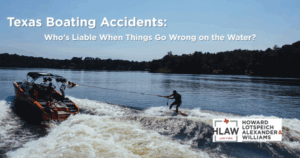
Boating accidents on Texas lakes and rivers can lead to serious injuries. Our attorneys explain who may be liable and how to protect your rights.
Boating is a favorite pastime across Texas — from the shores of Eagle Mountain Lake and Possum Kingdom Lake to the Gulf Coast. But when fun on the water turns into tragedy, victims and their families often face serious injuries, costly medical bills, and tough legal questions about who is responsible.
Under Texas law, boating accident liability can be complex, involving state boating regulations, general negligence principles, and in some cases, criminal statutes for intoxicated operation. Here’s what you need to know if you’ve been involved in a recreational accident on Texas lakes, rivers, or coastal waters.
Texas Boating Laws at a Glance
The Texas Parks and Wildlife Department (TPWD) enforces state boating laws found primarily in Texas Parks & Wildlife Code, Chapter 31. These laws govern everything from boat registration to safety equipment requirements. For accident liability, key provisions include:
- Operating a Vessel in a Negligent or Reckless Manner – Under Tex. Parks & Wild. Code § 31.099, it is an offense to operate a boat in a way that endangers the life, limb, or property of another person. This includes excessive speed, unsafe turns, or creating hazardous wakes.
- Boating While Intoxicated (BWI) – Similar to driving a car, operating a boat while intoxicated is prohibited under Tex. Penal Code § 49.06. A person is considered intoxicated if they have a blood alcohol concentration (BAC) of 0.08% or more, or if they lack the normal use of mental or physical faculties due to alcohol or drugs. BWI is a criminal offense that can also form the basis for civil liability.
- Duty to Render Aid and Report Accidents – Under Tex. Parks & Wild. Code § 31.104, boat operators involved in an accident must stop, render aid, and exchange information. § 31.105requires reporting any accident involving death, disappearance, or injury requiring more than first aid to TPWD within 48 hours, and property damage over $2,000 within 30 days.
Civil Liability for Boating Accidents
When a boating accident occurs, victims may bring a personal injury or wrongful death claimunder Texas negligence law. To establish liability, you must generally prove:
- Duty of Care– The boat operator owed passengers and others on the water a duty to operate safely.
- Breach of Duty– The operator violated that duty, for example by speeding, failing to maintain a proper lookout, or boating while intoxicated.
- Causation– The breach directly caused the accident and resulting injuries.
- Damages– You suffered measurable harm (medical expenses, lost wages, pain and suffering, etc.).
Who Can Be Held Liable?
Boating accident claims often involve multiple responsible parties:
- The Boat Operator – If the operator acted negligently or recklessly, they may be directly liable.
- The Boat Owner – Even if they weren’t driving, an owner who negligently entrusted the vessel to an incompetent or intoxicated operator can be held liable under the doctrine of negligent entrustment.
- Marinas, Rental Companies, or Tour Operators – Businesses that rent or charter boats can be liable for negligent maintenance, failure to provide safety instructions, or renting to unqualified or intoxicated individuals.
- Other Negligent Parties – Liability may extend to other boaters whose actions contributed to the collision or to manufacturers of defective equipment under Texas product liability law(Tex. Civ. Prac. & Rem. Code Chapter 82).
Boating While Intoxicated: Civil and Criminal Consequences
BWI is not only a criminal offense but strong evidence of negligence in a civil claim. A conviction can support a finding of negligence per se, meaning the violation of the statute is presumed to be negligent if it caused the injuries.
In cases involving gross negligence—conduct showing conscious indifference to the rights or safety of others—Texas law allows for exemplary damagesunder Tex. Civ. Prac. & Rem. Code § 41.003.
Common Boating Accident Scenarios in Texas
- Collisions between two vessels
- Boat striking a dock, swimmer, or fixed object
- Falls overboard leading to drowning
- Water skiing or tubing accidents
- Mechanical failure due to poor maintenance
- Accidents caused by intoxicated or inexperienced operators
Steps to Take After a Boating Accident
- Seek Medical Attention Immediately– Even minor injuries can worsen if untreated.
- Report the Accident– Follow the reporting requirements under Texas law.
- Gather Evidence– Take photos, collect witness statements, and preserve any available video (including GoPro or cell phone footage).
- Avoid Giving Recorded Statements to Insurers– Consult a lawyer first.
- Contact a Texas Boating Accident Attorney– An attorney can investigate, identify liable parties, and pursue full compensation.
Key Takeaways & How HLAW Can Help With Texas Boating Accident ClaimsBottom Line
Texas boating accident cases blend elements of personal injury law, maritime safety regulations, and sometimes criminal law. Whether your accident happened on Lake Texoma, the Brazos River, or along the Gulf Coast, identifying the responsible parties and proving negligence is key to recovery.
If you or a loved one has been injured in a boating accident, Howard, Lotspeich, Alexander & Williams, PLLCcan help you navigate the legal waters and fight for the compensation you deserve. We offer free consultations and case evaluations and we don’t get paid unless you do. If you or a friend or family member has been seriously injured in a boating accident, contact us for a free consultation.










